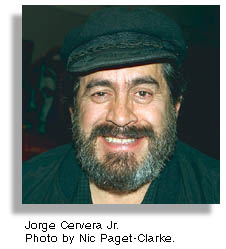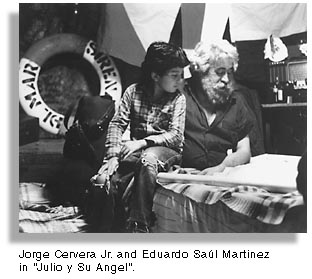|
"Any film that depicts a human being I think is a valid film."
Jorge Cervera Jr.
Thirty million people cannot go on forever without being represented Interview by Fred Salas San Diego, California
Fred Salas: Was this a good screening for you? Jorge Cervera Jr.: It was a wonderful one, one of the better ones, because sometimes it takes a while for the audience to warm up. Especially late like his. But from the beginning, people were reacting to the scenes and laughing. Fred Salas: I've been to lots of screenings, and there seemed to be lots of warmth. Have you got that from your film? That it's evoking warm feelings from people? Jorge Cervera Jr.: Yes, but this one in particular was very rewarding because of the spontaneity of the people and the quickness with which they got in with the story, and with the characters, and with the situations. This is the ultimate dream, for people to understand your movie. Fred Salas: It must be gratifying because outside you had a reaction from that little girl who loved the film, and then from these women who were buying the video for their grandchildren. Jorge Cervera Jr.:Exactly. And like I say, all the time when they ask me, 'who did you make the film specifically for,' I say children, only children, five to 95. Fred Salas: What kind of films do you think we need to make in order to get rid of the stereotypes? Jorge Cervera Jr.: Any film that depicts a human being I think is a valid film. In the end those films that reflect us in good or bad light have to have a human side. If the character has a humanity, then it's a valid character. Even if it's a rotten character. The bad thing is to dehumanize the character and just to stereotype it. And that is the image that affects the most the children, the young people. They are very impressionable. When they see themselves as gang-bangers, as drug dealers or peons, they don't aspire to anything else. I can't tell anyone what to do with their money, you know. This is the land of freedom. But I do suggest that at least us, of Hispanic ancestry, when we decide to make a film, we have to represent us as human beings. To counteract the other representations. Even the Mexican films right now that are so popular, such as Los Almada , are nothing but stereotypes. They are reverse stereotypes, but still they dehumanize. They are bad for the young people because – I don't care what anybody else says – when I was twelve, thirteen, I started smoking because I saw it on the screen. Hey, the big macho guys on the film were smoking, I was smoking myself. Fred Salas: We have these films because the big distribution companies think this is what all Mexicans are, what we want to see. What can we do about distribution to get the Latino films to Latino audiences besides through festivals? Jorge Cervera Jr.: The establishment has a social political idea that Latinos, Hispanics, Mexicans, are a labor force only. Therefore they do not want to elevate us because it is going to cost them more for that labor. Whether they want to accept it or not, they maintain that lid. What they are doing is they are building a pressure cooker. I said, ten years ago, before Alonfso Aurau came out with Like Water for Chocolate, I sat with him and I told him, in less than ten years there's going to be an explosion of movies that are geared for the Hispanic audience. Thirty million people cannot go on forever without being represented, without being given the right amount of exposure. I'm not saying more, but not none I don't want all of a sudden all films be about Mexicans with Mexicans for Mexicans or Latinos. No, no, it can't be. It's illogical. But I say that if we are ten percent of the population, then ten percent of the movies and television shows should reflect us honestly, and then we would be very happy. We pay taxes, and we contribute a lot to this society. They can't get us out of here. That's the point. We are here to stay. We were here before, and we are here to stay. We are the biggest supporters of the movies. You go to any heavily Hispanic populated area in the country. You go to a theater and they have Titanic, or they have an Arnold movie, or they have Wag the Dog, and you count heads, and you see a lot of Hispanics. We love to go to the movies. We love to support them And if they give us the chances, we'll pack the theaters. Like tonight. It's just a matter of getting the opportunity. Ofcourse there are going to be some duds. There are going to be some horrible movies that shouldn't be made, but that's part of the process. Fred Salas: You've been a character actor for many, many years, and a well-respected one.What's the difference between being an actor and being a first-time director? Jorge Cervera Jr.: The power. No, it's just the fact that as a character actor you are limited to the parts that they bring to the table. As a director, a producer, you can create your own part. For instance, this part that I played in this movie, a totally likable warm grandfather-type, even Santa Claus touches there. I would never be cast like that in Mexico or in Hollywood, because they will not believe that I have that humanity in me. Because of the way that I look. And because of the stereotypes that have been for so long. Therefore by doing my own film I was able to cast myself beyond my boundaries. That's the big difference. |
If you have any thoughts on this or would like to contribute to an ongoing discussion in the  What is New? || Affirmative Action || Art Changes || Autonomy: Chiapas - California || Community Images || Education Rights || E-mail, Opinions and Discussion || En español || Essays from Ireland || Global Eyes || Healthcare || Human Rights/Civil Rights || Piri Thomas || Photo of the Week || QA: Interviews || Region || Rural America || Search || Donate || To be notified of new articles || Survey || In Motion Magazine's Store || In Motion Magazine Staff || In Unity Book of Photos || Links Around The World NPC Productions Copyright © 1995-2020 NPC Productions as a compilation. All Rights Reserved. |


 Jorge Cervera Jr. is a well-known actor with roles in hundreds of film. He attended the San Diego/Baja California Latino Film Festival as the director and producer of Julio y su Angel.
Jorge Cervera Jr. is a well-known actor with roles in hundreds of film. He attended the San Diego/Baja California Latino Film Festival as the director and producer of Julio y su Angel.